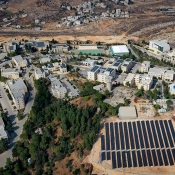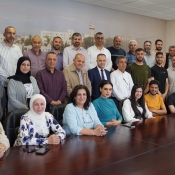7amleh, Media Development Center tackle cybersecurity education
In cooperation with Birzeit University’s Media Development Center (MDC), the Arab Center for the Advancement of Social Media–7amleh held its first conference, themed “Digital Security Education,” on November 5, 2019, under the auspices of the Palestinian Ministry of Education and with the support of DW Akademie.
Attending the conference were 200 participants from institutions of higher education and representatives of civil society organizations, legalists, activists and researchers. The participants looked into ways to raise awareness of the importance of digital security and integrate it into educational practices.
The conference was inaugurated by the Nibal al-Thawabteh, director of MDC, who highlighted the center’s efforts to combat digital illiteracy, explaining that digital literacy is essential for quality journalism in the modern world.
Speaking on the behalf of Khuloud Nasser, the acting director of international and general relations in the ministry of education, Thaer Thabet reaffirmed the ministry’s commitment to strengthening its networks with higher education institutions, especially in areas that are of interest to the younger generation.
Mona Shtaya, a member of 7amleh’s consultancy committee, presented the center’s latest research, titled “Silenced Networks,” that helps answer questions about Palestinian youth’s political participation in the online sphere.
The first session focused on the lessons learnt from experiences in digital security as it relates to education in Palestine. Moderating the first session was Amal Nazzal, an associate professor at the Faculty of Business and Economics. Nadim Nashif, 7amleh’s director, presented a paper titled “Is a manual enough to guarantee digital security?” questioning the ability of manuals that draft laws and regulations to achieve digital security and help users of social media platforms stay safe online. The second talk was presented by Saeda Affouneh, the dean of educational sciences at An-Najah University, who suggested ways for families to protect their children and teenagers from cybercrimes.
Saleh Masharqa, the Research and Policy Coordinator at MDC, presented the third intervention and explained the goals of Birzeit University’s the newly launched diploma in digital media, calling it an example of the digitization of academic education. The session concluded with a presentation by Thaer Thabet, director of the educational media department at the ministry, in which he talked about the methods the government uses to promote media and digital awareness in the Palestinian education sector.
The second session, moderated by the communication expert Maryam Shaheen, focused on the impact of the digital world on human rights, especially for Palestinians. Antonella Napolitano, a policy officer at Privacy International, opened the session by delving into digital threats human rights organizations face from an international perspective. Next, Khalil Shreteh, information and security officer at Al Quds Open University, talked about the negative impact individuals suffer whose social media accounts have been hacked. The last intervention, presented by Suheir Farrak, the general director of Women’s Media and Development Organization–Tam, explained the impact of digital violence on an individual’s privacy.
After the two sessions, participants were divided into groups to take part in workshops that tackled issues on social media intelligence, gender-based violence and the internet, security threats and digital security outside the virtual space, and organizational digital security tr









